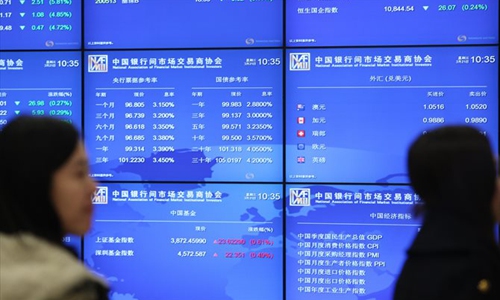
Two women look at a screen for the interbank lending rate in the National Association of Financial Market Institutional Investors in Beijing. File photo: CFP
International index provider FTSE Russell announced to include Chinese sovereign bonds in its flagship bond index from the end of October, as China further opens up its capital market to global investors.
The index provider said in an announcement on Monday that Chinese government bonds (CGBs) will be added to the FTSE World Government Bond Index (WGBI) from October 29 over three years.
When fully included, Chinese bonds' weighting in the FTSE index will be around 5.25 per cent, the sixth largest following the US, Japan, France, Italy and Germany.
It seemed an inevitable trend for the global index provider to include Chinese sovereign bonds. Having the second-largest economy is to make the index more inclusive, Dong Dengxin, director of the Finance and Securities Institute at the Wuhan University told the Global Times on Tuesday.
"China's government debts are increasingly popular with global investors, attracted by its yield which is 2 to 3 percent higher than US Treasury bonds," he said.
The benchmark 10-year CGBs yielded 3.2 percent on Tuesday compared with a 1.7 percent US 10-year bonds' yield.
FTSE is the last of the three main index compilers to add Chinese bonds after the CBGs were included in index suites from JPMorgan and Bloomberg Barclays.
Recent reforms has made international investors' participation in Chinese bond markets easier, including removing quotas restriction on the qualified foreign institutional investor (QFII) scheme and its sibling, RQFII, Dong said.
Standard Chartered expected China's sovereign bonds to see total inflows of $130 billion to $156 billion from the inclusion in a year while analysts from HSBC are forecasting inflows of $130 billion.
"The capital inflow will have a great impact on further opening of the capital market that will accelerate the internationalization of yuan," Dong said.

